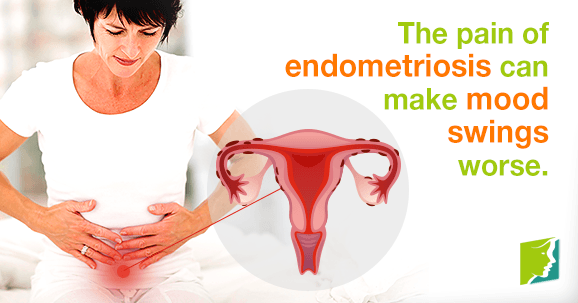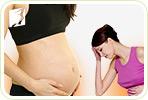During menopause, mood swings are a very common occurrence. One moment you can be happy and productive, and the next you can be running to your room sobbing. The emotional pain that one goes through during these bursts can get in the way of your professional and personal life, and they have many potential causes.
Endometriosis is a physically painful condition that affects over 4.5 million women in the United States. Although it can arise among any woman of reproductive age, it is most common in a woman's 30s and 40s.
What Is Endometriosis?
Endometriosis occurs when the tissue that lines the uterus, known as the endometrium, grows in places that it shouldn't. In endometriosis, it is often found on the ovaries, fallopian tubes, and lining of the pelvic cavity causing pain in the lower abdomen, lower back, and pelvis.
Symptoms are typically worst during periods and during and after sex. However, for some women, the pain is ongoing and causes other symptoms like fatigue, digestive complications, and an increased likelihood of infections. Endometriosis can even cause infertility. Although these growths are benign (non-cancerous), they can be very disruptive, especially when hormone levels are fluctuating.
How Might it Cause Mood Swings?
Mood swings are unpredictable. Especially when a woman's sex hormone levels are shifting, as they do during menopause, she can be set off by the pettiest things. Mood swings become even worse when there are actual concrete issues to be dealt with, the anxiety will multiply and cause more intense irritability, restlessness, and possibly depression.
Since endometriosis is often painful, it can get in the way of a women's ability to go out and have a good time with others. Women with this condition will be more likely to stay inside and avoid interaction with close friends and loved ones.
What Can I Do?
Luckily, the general recommendation to reduce chances of getting endometriosis is to lower your estrogen levels. This is convenient because during menopause, your estrogen levels are already decreasing. This means if you had endometriosis in the past, you may find that its severity will go down during menopause. Other women will opt for pain medication, hormone treatment, and hysterectomy, but these should be done with caution and after discussing all the options with a doctor.
What Are Other Causes?
Other causes of both mood swings and endometriosis are lack of exercise, high body fat, and excessive consumption of alcohol and caffeine. You may want to try eliminating these triggers to see what may be causing the pain that you are experiencing.
This painful condition should not be overlooked. If you think you might have endometriosis, you should get checked through a pelvic exam, ultrasound, or laparoscopy. Although the pain may be hard to overcome in both body and mind, keeping fit and avoiding triggers will help you find relief.
Sources
- National Institutes of Health. (2014). Endometriosis. Retrieved March 11, 2014, from http://www.nlm.nih.gov/medlineplus/endometriosis.html
- Office on Women's Health. (2012). Endometriosis Fact Sheet. Retrieved March 11, 2014, from http://womenshealth.gov/publications/our-publications/fact-sheet/endometriosis.html




